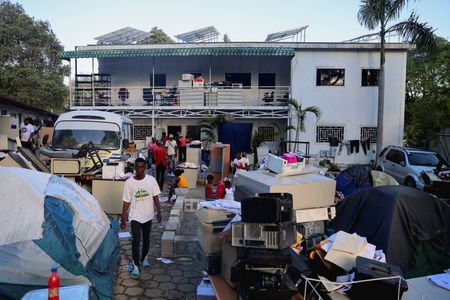PORT-AU-PRINCE (Reuters) -Over 60 rights groups signed a letter to French President Emmanuel Macron calling for reparations to Haiti over the crippling payments it paid France as compensation for lost “property” – including slaves – after its independence.
The letter dated on Tuesday came as activists in Haiti, which has the lowest GDP per capita in the Americas and is battling a worsening gang conflict amid little international support, call for billions of dollars in reparations.
“The wealth extracted under this ransom set Haiti’s GDP growth back by decades, and resulted in a cycle of foreign aid dependence and entrenched debt that persists to this day,” the letter said. “It is long past time for France to acknowledge and remedy this injustice.”
Signatories included diaspora and reparations groups in the United States, Africa, and elsewhere in the Caribbean. Macron in April said he would set up a joint Franco-Haitian commission to examine their “painful” past but avoided discussing reparations.
Haiti’s Culture and Communications Minister Patrick Delatour said after a visit to France in May that work on the commission, made up of historians mandated to examine the consequences of the debt, was set to begin in July.
He said the aim was to pave the way for reparations.
The groups’ letter follows the 200-year-anniversary of Haiti’s newly independent government acceding to the payments, which Haiti considers a ransom paid under threat of invasion. The so-called double debt, compounded by interest payments, was paid over the course of a century.
Caribbean regional bloc CARICOM also supports Haiti’s claim and is working with African nations to seek broader reparations for the ongoing impacts of slavery from former colonizing nations.
Reparation demands include calls for funding for development programs ranging from health, education and culture and the cancellation of debt.
(Reporting by Harold Isaac; Writing by Sarah Morland; Editing by Aida Pelaez-Fernandez and Brendan O’Boyle)









